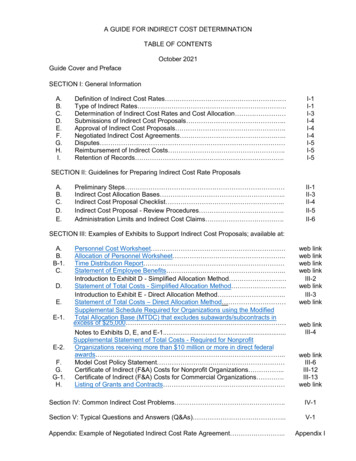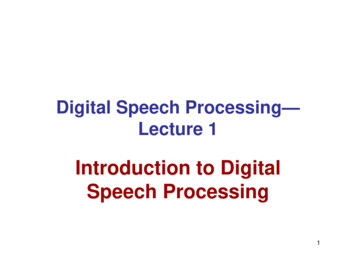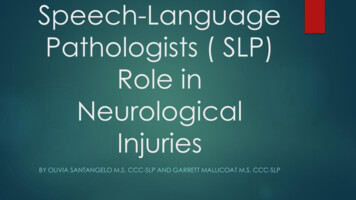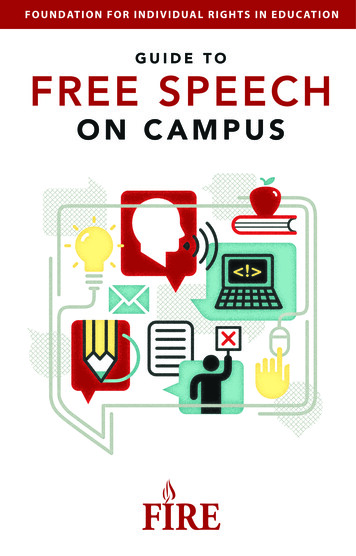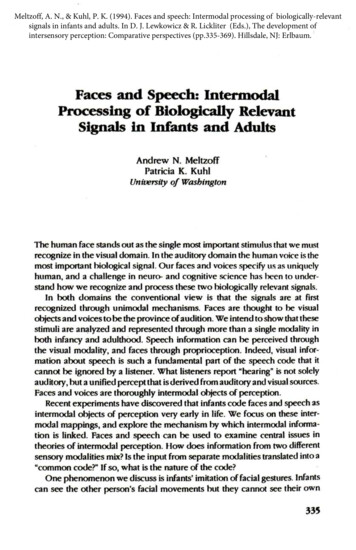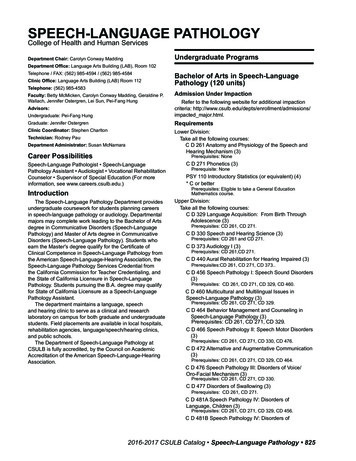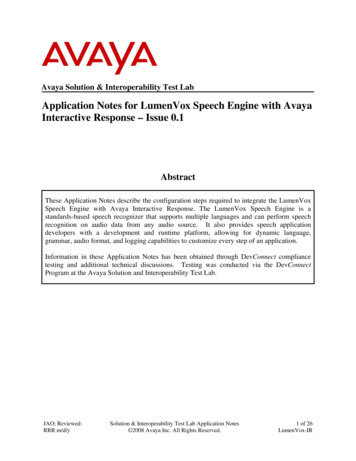
Transcription
English – Direct & Indirect Speech – Concepts E-book
English – Direct & Indirect Speech – Concepts E-bookStay Connected with SPNotifierEBooks for Bank Exams, SSC & Railways 2020General Awareness EBooksComputer Awareness EBooksMonthly Current Affairs Capsules
English – Direct & Indirect Speech – Concepts E-bookDirect and Indirect Speech Concepts, Rules, Tips and ExamplesINTRODUCTION TO ENGLISH LANGUAGE:English Knowledge is an important section in the employment-related competitive exams in India. Inparticular, English Language Section is one of the key sections in recruitment exams in India including butnot limited to Banking, Railways, Staff Selection Commission, Insurance, Teaching, UPSC and manyothers. The English Language section has questions related to Reading Comprehension, Cloze Test, Fill inthe Blanks, Error Spotting, Grammar, Sentence Improvement, Direct and Indirect Speech etc.DIRECT SPEECH AND INDIRECT SPEECH CONCEPTS1. What is Direct speech?Saying exactly what somebody has said is called direct speech.2. What is indirect speech?Indirect speech, doesn’t utilize quotes to encase what the individual said and it doesn’t need to beword for word.DIRECT SPEECH AND INDIRECT SPEECH RULESRule 1:If in direct speech one can discover say/says or will say then DO NOT CHANGE THE TENSE that discoverinside the quotes.Example Rule 2:Direct Speech – She says,” I was a fool then”Indirect Speech – She says he was a fool then.
English – Direct & Indirect Speech – Concepts E-bookIf in direct speech the words inside the quotes discuss a well-known fact or constant activity, then RULEONE is taken after or at the end of the day the strained inside the quotes is not changed by any means.Example Direct Speech – John said,” The sun rises in the east”Indirect Speech – John said the sun rises in the east.Rule 3:In the event that there is “said” in the direct speech then the tense of the words inside quotes is changedto the past tense.Example Direct Speech – She said,” I killed an ant”Indirect Speech – She said she had killed an ant.DIRECT AND INDIRECT SPEECH TIPSTip 1: Conversion Rules as per the Reporting Verb:a. When the reporting or principal verb is in the Past Tense, all Present tenses of the direct are changedinto the corresponding Past Tenses.A. Direct: He said, “I am unwell.”B. Indirect: He said (that) he was unwell.b. If the reporting verb is in the Present or Future Tense, the tenses of the Direct Speech do not change.A. Direct: He says/will say, “I am unwell.”B. Indirect: He says/will say he is unwell.c. The Tense in Indirect Speech is NOT CHANGED if the words within the quotation marks talk of auniversal truth or habitual action.
English – Direct & Indirect Speech – Concepts E-book Direct: They said, “We cannot live without water.”Indirect: They said that we cannot live without water.Tip 2: Conversion Rules of Present Tense in Direct Speech:a. Simple Present Changes to Simple PastA. Direct: "I am happy", she said.B. Indirect: She said that she was happy.b. Present Continuous Changes to Past ContinuousA. Direct: "I am reading a book", he explained.B. Indirect: He explained that he was reading a book.c. Present Perfect Changes to Past PerfectA. Direct: "I have been to Gujarat", he told me.B. Indirect: He told me that he had been to Gujarat.Tip 3: Conversion Rules of Past & Future Tensea. Simple Past Changes to Past PerfectA. Direct: He said, “Ira arrived on Monday."B. Indirect: He said that Ira had arrived on Monday.b. Past Continuous Changes to Past Perfect ContinuousA. Direct: "We were living in Goa", they told me.B. Indirect: They told me that they had been living in Goa.c. Future Changes to Present ConditionalA. Direct: He said, "I will be in Kolkata tomorrow."
English – Direct & Indirect Speech – Concepts E-bookB. Indirect: He said that he would be in Kolkata the next day.d. Future Continuous Changes to Conditional ContinuousA. Direct: She said, "I'll be using the car next Friday.”B. Indirect: She said that she would be using the car next Friday.Tip 4: Changes in Modelsa. CAN change into COULDA. Direct: He said, "I can swim."B. Indirect: He said that he could swim.b. MAY change into MIGHTA. Direct: He said, "I may buy a house.”B. Indirect: He said that he might buy a house.c. MUST change into HAD TO/WOULD HAVE TOA. Direct: He said, "I must work hard.”B. Indirect: He said that he had to work hard.d. Modals that DO NOT Change: Would, Could, Might, Should, Ought to.A. Direct: He said, "I should face the challenge.”B. Indirect: He said that he should face the challenge.Tip 5: Conversion of Interrogativea. Reporting Verb like ‘said/ said to’ changes to asked, enquired or demandedA. Direct: He said to me, “What are you doing?”B. Indirect: He asked me what I was doing.
English – Direct & Indirect Speech – Concepts E-bookb. If sentence begins with auxiliary verb, the joining clause should be if or whether.A. Direct: He said, “Will you come for the meeting?”B. Indirect: He asked them whether they would come for the meeting.c. If sentence begins with ‘why’ questions then no conjunction is used as the "question-word" itself actas joining clause.A. Direct: “Where do you live?” asked the girl.B. Indirect: The girl enquired where I lived.Tip 6: Command, Request, Exclamation, Wisha. Commands and RequestsIndirect Speech is introduced by some verbs like ordered, requested, advised and suggested. Forbid(s)/forbade is used for the negative sentences. The imperative mood is changed into the Infinitive.A.B.C.D.Direct: Rafique said to Ahmed, “Go away.”Indirect: Rafique ordered Ahmed to go away.Direct: He said to her, “Please wait.”Indirect: He requested her to wait.b. Exclamations and WishesIndirect Speech is introduced by some words like grief, sorrow, happiness, applaud. Exclamatory sentencechanges into assertive sentence and Interjections are removed.A. Direct: He said, “Alas! I am undone.”B. Indirect: He exclaimed sadly that he was broke.Tip 7: Change of Pronounsa. The first person of the reported speech changes according to the subject of reporting speech.A. Direct: She said, “I am in ninth class.”B. Indirect: She says that she was in ninth class.
English – Direct & Indirect Speech – Concepts E-bookb. The second person of reported speech changes according to the object of reporting speech.A. Direct: He says to them, "You have completed your job.”B. Indirect: He tells them that they have completed their job.c. The third person of the reported speech doesn't change.A. Direct: He says, "She is in tenth class.”B. Indirect: He says that she is in tenth class.Tip 8: Change of Place and Timea. Words expressing nearness in time or place in Direct Speech are generally changed into wordsexpressing distance in Indirect Speech.Now -- thenHere -- thereAgo -- beforeThus -- soToday -- that dayTomorrow -- the next dayThis -- thatYesterday -- the day beforeThese -- thoseHither-- thitherCome -- goHence -- thenceNext week/month -- following week/monthA. Direct: She said, “My father came yesterday.”B. Indirect: She said that her father had come the day before.C. Direct: She says/will say, “My father came yesterday.”
English – Direct & Indirect Speech – Concepts E-bookD. Indirect: She says/will say that her father had come yesterday. (Here the reporting verb ‘says’ is inthe present tense OR ‘will say’ is in future tense; hence the time expression ‘yesterday’ won’tchange.)Tip 9: Punctuationa. The words that are actually spoken should be enclosed in quotes and begin with a capital letterA. Example: He said, “You are right.”b. Comma, full stop, question mark, or exclamation mark must be present at the end of reportedsentences and are placed inside the closing inverted comma or commas.A. Example: He asked, “Can I come with you?”c. If direct speech comes after the information about who is speaking, comma is used to introduce thepiece of speech, placed before the first inverted comma.A. Example: She shouted, “Stop talking!”B. Example: “Thinking back,” she said, “he didn't expect to win.” (Comma is used to separate thetwo reported speech and no capital letter to begin the second sentence).Tip 10: Conversion of Indirect to Direct Speech1. Use the reporting verb, "say" or "said to" in its correct tense.2. Remove the conjunctions "that, to, if or whether etc." wherever necessary.3. Insert quotation marks, question mark, exclamation and full stop, as per the mood of thesentence.4. Put a comma before the statement.5. Write the first word of the statement with capital letter.6. Change the past tense into present tense wherever the reporting verb is in the past tense.7. Convert the past perfect either into past tense or present perfect as found necessary.Example:A. Indirect: He asked whether he is coming.
English – Direct & Indirect Speech – Concepts E-bookB. Direct: He said to him, “Are you coming?”DIRECT AND INDIRECT SPEECH PREVIOUS YEAR AND NEW PATTERN QUESTIONS1. In the questions below the sentences have been given in Direct/Indirect speech. From the givenalternatives, choose the one which best expresses the given sentence in Indirect/Direct speech. Nitaordered her servant to bring her a cup of tea.A.B.C.D.E.Nita told her servant, "Bring a cup of tea."Nita said, "Bring me a cup of tea."Nita said to her servant, "Bring me a cup of tea."Nita told her servant, "Bring her that cup of tea."None of theseAnswer: C2. In the questions below the sentences have been given in Direct/Indirect speech. From the givenalternatives, choose the one which best expresses the given sentence in Indirect/Direct speech. Shesaid to her friend, "I know where everyone is"A.B.C.D.E.She told that she knew where everyone was.She told her friend that she knew where everyone was.She told her friend that she knew where everyone is.She told her friend that she knows where was everyoneNone of theseAnswer: B3. In the questions below the sentences have been given in Direct/Indirect speech. From the givenalternatives, choose the one which best expresses the given sentence in Indirect/Direct speech. Mycousin said, "My room-mate had been snoring throughout the night."A.B.C.D.E.My cousin said that her room-mate had been snoring throughout the night.My cousin told me that her room-mate snored throughout the night.My cousin complained to me that her room-mate is snoring throughout the night.My cousin felt that her room-mate may be snoring throughout the night.None of theseAnswer: A
English – Direct & Indirect Speech – Concepts E-book4. In the questions below the sentences have been given in Direct/Indirect speech. From the givenalternatives, choose the one which best expresses the given sentence in Indirect/Direct speech."Please don't go away", she said.A.B.C.D.E.She said to please her and not go away.She told me to go away.She begged me not to go away.She begged that I not go away.None of theseAnswer: C5. In the questions below the sentences have been given in Direct/Indirect speech. From the givenalternatives, choose the one which best expresses the given sentence in Indirect/Direct speech.Kiran asked me, "Did you see the Cricket match on television last night?"A.B.C.D.E.Kiran asked me whether I saw the Cricket match on television the earlier nightKiran asked me whether I had seen the Cricket match on television the earlier nightKiran asked me did I see the Cricket match on television the last nightKiran asked me whether I had seen the Cricket match on television the last night.None of theseAnswer: D6. In the questions below the sentences have been given in Direct/Indirect speech. From the givenalternatives, choose the one which best expresses the given sentence in Indirect/Direct speech.David said to Anna, "Mona will leave for her native place tomorrow."A.B.C.D.E.David told Anna that Mona will leave for her native place tomorrowDavid told Anna that Mona left for her native place the next dayDavid told Anna that Mona would be leaving for her native place tomorrowDavid told Anna that Mona would leave for her native place the next dayNone of theseAnswer: D7. In the questions below the sentences have been given in Direct/Indirect speech. From the givenalternatives, choose the one which best expresses the given sentence in Indirect/Direct speech. Isaid to him, "Why are you working so hard?"A.B.C.D.E.I asked him why he was working so hardI asked him why was he working so hardI asked him why had he been working so hardI asked him why he had been working so hardNone of these
English – Direct & Indirect Speech – Concepts E-bookAnswer: A8. In the questions below the sentences have been given in Direct/Indirect speech. From the givenalternatives, choose the one which best expresses the given sentence in Indirect/Direct speech. Thetailor said to him, "Will you have the suit ready by tomorrow evening?"A.B.C.D.E.The tailor asked him that he will have the suit ready by the next eveningThe tailor asked him that he would had the suit ready by the next eveningThe tailor asked him if he would have the suit ready by the next eveningThe tailor asked him if he will like to the suit ready by the next eveningNone of theseAnswer: C9. In the questions below the sentences have been given in Direct/Indirect speech. From the givenalternatives, choose the one which best expresses the given sentence in Indirect/Direct speech. Hesaid. "Be quiet and listen to my words."A.B.C.D.E.He urged them to be quiet and listen to his wordsHe urged them and said be quiet and listen to his wordsHe urged they should be quiet and listen to his wordsHe said you should be quiet and listen to his wordsNone of theseAnswer: A10. In the questions below the sentences have been given in Direct/Indirect speech. From the givenalternatives, choose the one which best expresses the given sentence in Indirect/Direct speech. Hesaid, “I cannot help you at present because I myself am in difficulty."A.B.C.D.E.He said that I cannot help you at present because I myself in difficultyHe said that he could not help me at present because he himself was in difficultyHe told that he could not help you at present because he was himself in difficultyHe asked that he could not help you at present because he was himself in difficulty.None of theseAnswer: B11. In the questions below the sentences have been given in Direct/Indirect speech. From the givenalternatives, choose the one which best expresses the given sentence in Indirect/Direct speech. Hetold her, "I want to meet your father":A. He told her that I want to meet your fatherB. He told her that he wanted to meet her fatherC. He told her that he wanted to meet your father
English – Direct & Indirect Speech – Concepts E-bookD. He told her that she wanted to meet her father.E. None of theseAnswer: B12. In the questions below the sentences have been given in Direct/Indirect speech. From the givenalternatives, choose the one which best expresses the given sentence in Indirect/Direct speech. Hesays, ''I don't want to play anymore."A.B.C.D.E.He says that he doesn't want to play any moreHe says that I don't want to play anymore.He says that I didn't want to play any moreHe says that he didn't want to play any moreNone of theseAnswer: A13. In the questions below the sentences have been given in Direct/Indirect speech. From the givenalternatives, choose the one which best expresses the given sentence in Indirect/Direct speech. Thegovernment has announced, "Taxes will be raised":A.B.C.D.E.The government has announced that taxes will riseThe government has announced that taxes would raisedThe government has announced that taxes will be raisedThe government has announced taxes will be raised.None of theseAnswer: C14. In the questions below the sentences have been given in Direct/Indirect speech. From the givenalternatives, choose the one which best expresses the given sentence in Indirect/Direct speech.Mohan said, "We shall go to see the Taj in the moonlit night."A.B.C.D.E.Mohan said that we shall go to see the Taj in the moonlit nightMohan told that we shall go to see the Taj in moonlit nightMohan told that we should go to see the Taj in the moonlit night.Mohan said that they should go to see the Taj in the moonlit nightNone of theseAnswer: D15. In the questions below the sentences have been given in Direct/Indirect speech. From the givenalternatives, choose the one which best expresses the given sentence in Indirect/Direct speech. Theteacher said to Ram, “Congratulations! I wish you success in life."A. The teacher congratulated Ram and said wish you success in life
English – Direct & Indirect Speech – Concepts E-bookB.C.D.E.The teacher wished congratulations and success in life to RamThe teacher wished congratulations to Ram and wished him success in life.The teacher congratulated Ram and wished him success in lifeNone of theseAnswer: D16. In the questions below the sentences have been given in Direct/Indirect speech. From the givenalternatives, choose the one which best expresses the given sentence in Indirect/Direct speech. Thepoor examiner said, “OH God, have pity on me."A.B.C.D.E.The poor examiner prayed to God to have pity on himThe poor examiner, involving God, implored him to take pity on himThe poor examiner exclaimed that God have pity on himThe poor examiner commanded God to take pity on himNone of theseAnswer: A17. In the questions below the sentences have been given in Direct/Indirect speech. From the givenalternatives, choose the one which best expresses the given sentence in Indirect/Direct speech."Where will you be tomorrow," I said, "in case I have to ring you?"A.B.C.D.E.I asked where you will be the next day in case I will ring himI asked him where he would be the next day in case I had to ring him.I said to him where he will be in case I have to ring himI inquired about his whereabouts the next day in case I would have to ring him upNone of theseAnswer: B18. In the questions below the sentences have been given in Direct/Indirect speech. From the givenalternatives, choose the one which best expresses the given sentence in Indirect/Direct speech.Seeta said to me, “Can you give me your pen?”A.B.C.D.E.Seeta asked me can I give her my penSeeta asked me if I can give me your penSeeta asked me if I could give her my penSeeta asked me if I could give her my penNone of theseAnswer: C
English – Direct & Indirect Speech – Concepts E-book19. In the questions below the sentences have been given in Direct/Indirect speech. From the givenalternatives, choose the one which best expresses the given sentence in Indirect/Direct speech.Manna asked Rohan, "Have you sat in a trolley bus before?”A.B.C.D.E.Manna asked Rohan had he sat in a trolley bus earlier.Manna asked Rohan had he sat in a trolley bus beforeManna asked Rohan if he had sat on a trolley bus beforeManna asked Rohan if he has ever sat in a trolley busNone of theseAnswer: C20. In the questions below the sentences have been given in Direct/Indirect speech. From the givenalternatives, choose the one which best expresses the given sentence in Indirect/Direct speech.Farhan asked Geeta, "Could you lend me a hundred rupees until tomorrow?”A.B.C.D.E.Farhan asked Geeta whether she could lend him a hundred rupees until tomorrowFarhan asked Geeta whether she could lend him a hundred rupees until the next dayFarhan asked Geeta whether she could lend me a hundred rupees until the next dayFarhan asked whether Geeta could lend me a hundred rupees until the next dayNone of theseAnswer: B21. The Prime Minister said that no one would be allowed to disturb the peace.A.B.C.D.E.The Prime Minister said. 'We shall not allow anyone to disturb the peace.'The Prime Minister said. 'We would not allow no one to disturb the peace'The Prime Minister said. 'No one will disturb the peace.'The Prime Minister said. 'No one can disturb the peace.'None of theseAnswer: A22. He said. “It used to be a lovely, quiet street.”A.B.C.D.E.He said that it used to be a lovely, quiet street.He pointed out that it had used to be a lovely, quiet street.He said that there used to be a lovely, quiet street.He inquired whether there was a lovely, quiet street.None of theseAnswer: A23. He said to the interviewer. “Could you please repeat question? “
English – Direct & Indirect Speech – Concepts E-bookA.B.C.D.E.He requested the interviewer if he could please repeat the question.He requested the interviewer to please repeat the question.He requested the interviewer to repeat the question.He requested the interviewer if he could repeat the question.None of theseAnswer: D24. Socrates said, “Virtue is its own reward.”A.B.C.D.E.Socrates said that virtue had its own rewards.Socrates says that virtue is its own reward.Socrates said that virtue is its own reward.Socrates said that virtue was its own reward.None of theseAnswer: C25. Do as you wish. but don't come and ask me for help if you get into difficulties. “A.B.C.D.He told me to do as he wished or he wouldn't come and help me if I got into difficulties.He told me to do as I wished, but not to go and ask him for help if I got into difficulties.He ordered me to do as I wished. but not to go and ask him for help if. I got into difficulties.He told me that unless I did as I wished he would not come and help me if I got into difficulties.where had he been all thoseE. None of theseAnswer: B26. Mohan made this mess. Let him clear it up". said his father.A.B.C.D.E.Mohan's father said that Mohan had made the mess and proposed that he clear it up.Mohan's father said that Mohan had made the mess and that he was to clear it.Mohan’s father said that Mohan had made the mess and suggested that he clear it.Mohan‘s father said that Mohan had made the mess and that he should clear it.None of theseAnswer: D27. The teacher said to Ashok. “I shall report the matter to the Principal if you misbehave again."A. The teacher told Ashok that he would be reporting the matter to the Principal if he misbehavedagain.B. The teacher warned Ashok that he would report the matter to the Principal if he misbehavedagain.
English – Direct & Indirect Speech – Concepts E-bookC. The teacher threatened Ashok to report the matter to the Principal if he would misbehaveagain.D. The teacher cautioned Ashok about reporting the matter to the Principal if he misbehavedagain.E. None of theseAnswer: B28. I said, “When it gets dark, light the lantern and hang it out.”A.B.C.D.E.I said that when it got dark he light the lantern and hung it out.I requested that when it got dark he may light the lantern and hang it out.I said that when it got dark he should light the lantern and hang it out.I told that when it got dark he should light the lantern and hang it out.None of theseAnswer: C29. The queen said to her son. “You must go to the forest and remain there till your father calls youback.”A. The queen ordered her son to go to the forest and remain there till his father calls him back.B. The queen told her son that he must go to the forest and remain there till his father called himback.C. The queen told his son that you must go to the forest and remain there till your father calledyou back.D. The queen told her son to go to the forest and remained there till his father called him back.E. None of theseAnswer: B30. Call the first witness", said the Judge.A.B.C.D.E.The judge commanded to call the first witness.The judge commanded them to call the first witness.The judge commanded that the first witness be called.The judge commanded the first witness to be called.None of theseAnswer: C31. I said, “Let Mohan do his worst, he cannot harm me."A. I suggested to Mohan to do his worst, he could not harm me.B. I told that if Mohan did his worst, he could not harm me.C. I declared that Mohan might do his worst, he could not harm me.
English – Direct & Indirect Speech – Concepts E-bookD. I declared that though Mohan might do his worst, he could not harm me.E. None of theseAnswer: D32. The old man of Latur said. “Alas, my only son is dead!”A.B.C.D.E.The old man of Latur exclaimed with sorrow that his only son was dead.The old man of Latur told with pain that his only son was dead.The old man of Latur expressed with anguish that his only son was dead.The old man of Latur so fully narrated that his only son was dead.None of theseAnswer: A33. Everybody said. “How well she sings!”A.B.C.D.E.Everybody told us that she sings very well.Everybody exclaimed that she sings very well.Everybody exclaimed that she sang very well.Everybody told us that how she sang very well.None of theseAnswer: C34. Suppose you children go out for a nice long walk”. she said.A.B.C.D.E.She proposed that the children went out for a nice long walk.She advised that the children go out for a nice long walk.She suggested that the children go out for a nice long walk.She suggested that the children should go out for a nice long walk.None of theseAnswer: D35. The teacher said to Ram. “Would you like to go on a trip to Kashmir?" Ram said. “Yes"A. The teacher asked if Ram would like to go on a trip to Kashmir and Ram replied yes.B. The teacher asked Ram if he would like to go on a trip to Kashmir and Ram replied yes.C. The teacher asked Ram if he would have liked to go on a trip to Kashmir and Ram replied inthe affirmative.D. The teacher asked Ram if he would like to go on a trip to Kashmir and Ram replied in theaffirmative.E. None of theseAnswer: D
English – Direct & Indirect Speech – Concepts E-book36. Shanker said to his friend. “Look out! There is a snake behind you.”A.B.C.D.E.Shankar told his friend to look out as there was a snake behind him.Shanker exclaimed to his friend with surprise that there was a snake behind him.Seeing a snake behind him, Shanker asked his friend to look out.Shanker warned his friend that there was a snake behind him.None of theseAnswer: B37. 'From one of the windows of my flat I can see the Qutub Minar', said my friend.A.B.C.D.E.My friend told that from one of the windows of his flat he could see the Qutub Minar.My friend said that from one of the windows of his flat he can see the Qutub Minar.My friend said that from one of the windows of his flat he could see the Qutub Minar.My friend told that from one of the windows of his flat he can see the Qutub Minar.None of theseAnswer: C38. The teacher said to the student, “Why were you absent yesterday?”A.B.C.D.E.The teacher asked the student why had been he absent the previous day.The teacher asked the 'student why had he been absent the previous day.The teacher informed the student that why he had been absent the next day.The teacher asked the student why he had been absent the previous day.None of theseAnswer: D39. I said to her. “All your faults will be pardoned if you confess them.”A.B.C.D.E.I told her that all her faults will be pardoned if you confess them.I told her that all her faults would be pardoned if she confessed them.I told her that all her faults will have to be pardoned if she confessed them.I told her that all her faults would have to be pardoned if she confessed them.None of theseAnswer: B40. The Chief Minister said. “What a disaster the earthquake is!"A.B.C.D.E.The Chief Minister cried that the earthquake was a terrible disaster.The Chief Minister expressed with surprise that the earthquake was a terrible disaster.The Chief Minister exclaimed with sorrow that the earthquake was a terrible disaster.The Chief Minister told in pain that the earthquake was a terrible disaster.None of these
English – Direct & Indirect Speech – Concepts E-bookAnswer: C41. He said to her, 'Did it shake you up as much as it shook me'A.B.C.D.E.He asked her if it had shaken her up as much as it shook him.He enquired of her if it shook her up as it shook him.He enquired of her if it shook her up as much as it had shaken him.He asked her if it had shaken her up as it had shaken him.None of theseAnswer: D42. “Let's give a party", said Jaya, “Let's not." said her husband.A.B.C.D.E.Jaya suggested giving a party but her husband answered in the negative.Jaya suggested giving a party but her husband opposed the idea.Jaya suggested giving a party but her husband contradicted her.Jaya suggested giving a party but her husband refused.None of theseAnswer: A43. "Doctor”, the patient cried, please tell me how much time I have."A.B.C.D.E.The patient pleaded the doctor how much time she will have.The patient exclaimed to the doctor that how much time she had.The patient pleaded with the doctor to tell her how much time she had.The patient cried to the doctor that how much time had she.None of theseAnswer: B44. “Sam, will you help me carry my bags?” asked the old womanA.B.C.D.E.The old woman said to Sam to help her carried her bags.The old woman asked to Sam to help her carry her bags.The old woman asked Sam whether he would help her carry her bags.The old woman told Sam to helped her carry her bags.None of theseAnswer: C45. “So help me Heaven! He cried. “I never steal again".A. He wanted Heaven to help him so that he would never steal again.
English – Direct & Indirect Speech – Concepts E-bookB.C.D.E.He exclaimed to Heaven that he would never steal again.He exclaimed Heaven to help him that he would never stealHe called upon Heaven to witness his resolve never to steal again.None of theseAnswer: C46. He said to Sita, “When do you intend to pay back the money you borrowed from me?"A.B.C.D.E.He enquired Sita when did she intend to pay back the money she borrowed from him.He enquired Sita when she intended to pay back the money she borrowed from him.He enquired Sita when she intended to pay back the money she had borrowed from him.He enquired when Sita intended to pay back the money she borrowed from him.None of theseAnswer: C47. 'Fie! a soldier and afraid of fighting!” said Babar.A.B.C.D.E.Babar exclaimed with prise that a soldier should be afraid of fighting.Addressing a soldier. Babar cursed him that he should be afraid of fighting.Babar cursed the soldier who was afraid of fighting.Babar cursed and exclaimed that a soldier should not be afra
English - Direct & Indirect Speech - Concepts E-book Direct: They said, "We cannot live without water." Indirect: They said that we cannot live without water. Tip 2: Conversion Rules of Present Tense in Direct Speech: a. Simple Present Changes to Simple Past A. Direct: "I am happy", she said. B. Indirect: She said that she was happy. b.

